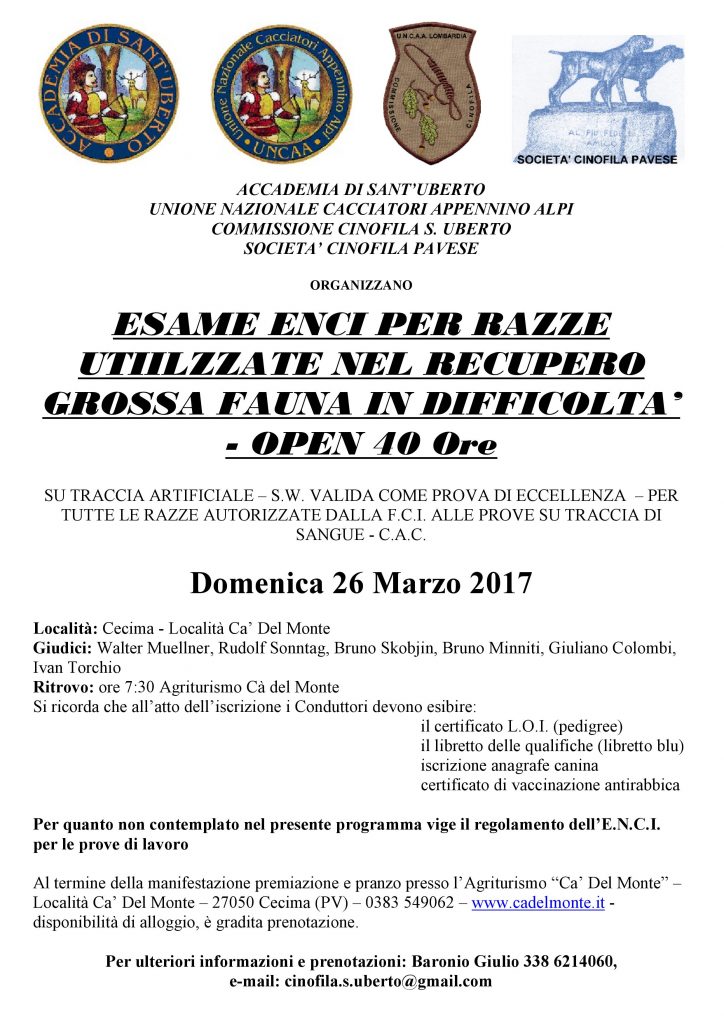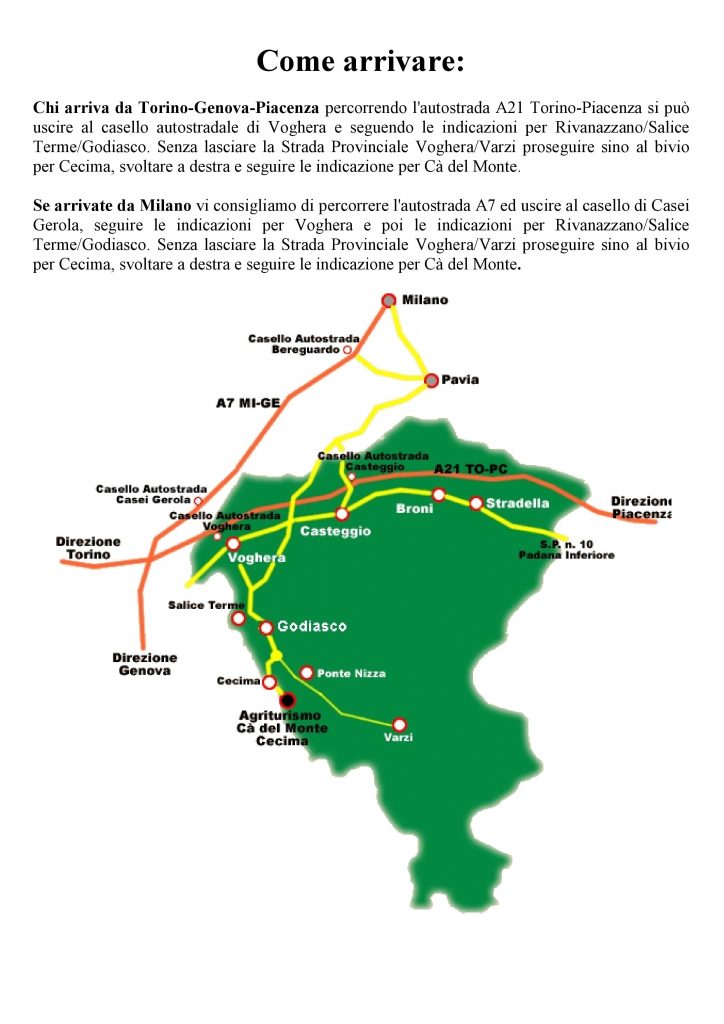Cecima – Prova ENCI Open per cani da traccia 40 Ore
Ricevo e inoltro, trovate nei files tutti i dettagli e i recapiti per avere maggiori informazioni.


Ricevo e inoltro, trovate nei files tutti i dettagli e i recapiti per avere maggiori informazioni.


Disclaimer: l’articolo originale è stato pensato per gli stranieri che volevano sapere come funzionano le cose in Italia, molti italiani lo sanno già ma ho comunque tradotto il pezzo per i neofiti.
Sembra facile ma così non è, iniziamo dall’Italia.
Come ci si iscrive ad una prova di lavoro per cani da ferma? Prima di tutto bisogna trovare la prova di lavoro. Qui le prove si tengono tutto l’anno, praticamente tutti i giorni, in svariate parti d’Italia, fatta eccezione di uno stop in primavera ed inizio estate in cui le prove vengono in parte sospese (ma si corre su quaglie). Ci sono anche prove italiane corse all’estero in posti come la Serbia, la Polonia o altri ma, limitiamoci a parlare dell’Italia. La prima cosa da fare è andare sul sito dell’ENCI e cliccare su “Manifestazioni ed Eventi”, scegliere prima il mese e poi il tipo di prova a cui ci si vuole iscrivere. Grande cerca? Classica o attitudinale a quaglie? Caccia a starne? Selvaggina Naturale? Vanno bene fagiani, starne e pernici o volete qualifiche su qualcosa di specialistico come i beccaccini, le beccacce o le prove su tipica alpina? Quando avete deciso, cliccate per i dettagli dell’ente organizzatore e lasciate che il divertimento cominci!

Chiamate il numero indicato, non vi risponderà nessuno perché l’ufficio è aperto solo dalle 17 alle 19 del martedì (giorni pari), e dalle 10 alle 11 di venerdì (giorni dispari). Quando provateil secondo numero elencato, tanto per essere ottimisti, non risolvi niente nuovamente. Prima di arrendervi, allora, mandate un’e-mail ma, due giorni dopo, siete ancora senza risposta. Visti gli accadimenti, ci si inizia a preoccupare e si cerca di rintracciare l’organizzatore attraverso canali informali, ovvero attraverso qualche conoscente. A questo punto generalmente si ottiene un numero di cellulare e si riesce a dialogare un con una voce. Lui, la voce (bisogna tenere a mente che il mondo dei cani da ferma in Italia è composto quasi esclusivamente da uomini), vi dirà che va bene, potete iscrivere il cane e che controllerà subito la vostra e-mail. In qualche caso sporadico la voce vi manderà due righe per chiedervi se siete davvero sicuri di volere possedere e condurre il cane allo stesso tempo: normalmente il conduttore è diverso dal proprietario e si tratta di un professionista. Molto più frequentemente, tuttavia, non riceverete mai una risposta. A volte succede persino che il conoscente, non vi dia nessun numero e vi dica semplicemente di stare calmi, che penserà a tutto lui.
Quando arriverà il giorno della gara, non saprete se vi stiano aspettando o meno. Tuttavia, in questo mondo fatto di incertezze, nessuno sembra interessarsi ai vostri soldi. Le iscrizioni costano normalmente 30 euro, ma nessuno mi ha mai chiesto soldi in anticipo, è normale pagare il giorno della gara. Perché questa prassi? Non lo so, potrebbe essere legata al fatto che ci si può iscrivere quasi fino all’ultimo momento e non c’è tempo per raccogliere soldi in anticipo. Inoltre, molti concorrenti, non sono avvezzi a pagamenti online e carte di credito e le poste sono pessime: chi si fida a spedire contanti? Un assegno? Spesso la banca chiede commissioni elevate. Comunque, insieme ai soldi dovete portare il libretto delle vaccinazioni (in cui deve esserci la vaccinazione contro la rabbia), i documenti del’anagrafe canina relativi al microchip e il libretto delle qualifiche in cui vengono segnati tutti risultati conseguiti dal cane durante la sua carriera. Il libretto è obbligatorio per i cani di proprietà italiana, i cani esteri possono farne a meno. Durante le prove, le razze da ferma inglesi corrono in coppia, mentre i continentali corrono singolarmente, le uniche prove previste a singolo per gli inglesi sono quelle a beccaccini e alcune prove su beccacce e tipica alpina e infine il Derby. In ogni prova ci sono più batterie e la classe in cui si corre è normalmente la classe Libera, generalmente ci sono 12 coppie per batteria. La classe Giovani è prevista di rado, e raramente vengono fatte le Oaks, ovvero batterie riservate alle femmine. È previsto un giudice per le prove con CAC e due giudici per le prove in cui è in palio un CACIT, il turno ha una durata di 15 minuti e possono esserci dei richiami. Gli errori commessi nel primo minuto sono perdonati.
Quando si tratta di prove, bisogna essere flessibili: a volte le date vengono modificate e per questo motivi non vengono programmate con mesi e mesi di anticipo. A volte le province non danno i permessi, o i permessi arrivano in ritardo; a volte il contadino “dimentica” di tagliare il raccolto, altre volte si mettono in mezzo la neve e altri eventi atmosferici. Per questo motivo conviene tenere sempre d’occhio il sito ENCI e controllare le date. Temo sia una cosa tutta italiana, da noi spesso è impossibile programmare eventi con largo anticipo perché, se è vero che qualcosa può succedere, è matematico che succederà. Tante date vengono spostate, è normale. Vogliamo parlare di esami universitari ballerini le cui date cambiano da un giorno all’altro? Di treni in ritardo o che non si fanno proprio vedere? Di scioperi improvvisi? Questo stile di vita non mi piace e fatico ad adattarmi ma, volendo vedere il buono nel cattivo, resta vera e grande la capacità tutta italiana di “arrangiarsi”, risolvere i problemi all’ultimo minute e lasciare tutti soddisfatti!
It seems easy but it is not! Let’s start from Italy.
How can you enter a trial in Italy? Well… You first have to find the trial. Trials are held almost daily in different part of the country, all year round but for spring and early summer (during this period there are still some trials on quail). To further complicate things, the ENCI (Italian Kennel Club) allows some Italian trials to be run abroad, in places such as Serbia, Poland and more. Anyway, let’s say you want to stick to Italy, all you have to do is go to the ENCI website and click on the section Manifestazioni e Eventi, pick a month and choose which kind of trial you are interested in. Grande Cerca (Grand Quete)? Caccia a Starne (Grey partridge)? Classica o attitudinale a quaglie (different kind of trials on quail)? Selvaggina Naturale (wild birds)? Let’s say you’d go for Selvaggina Naturale, which are the most popular trials, which kind of birds do you want your dog to be graded on? Pheasant, partridge (red legged and grey) suit you, or do you want anything more specific such as woodcock, snipe or mountain birds? Once you have found something you like, click on it to get the details of those organizing and let the fun begin!

You call the number you have found: none answers because that office is supposed to be open only from 5 to 7 Pm on Thursday (even days), and on 10-11 Am on Friday (odd days). You then try the second listed number, just in case, and nothing happens, again. Before giving up, you send an e-mail but, two days later, you realize you have not got any answers. At this point you begin worrying and decide you start tracking “the secretary” using informal channels, aka through common acquaintances. Once you obtain a cell phone number, and manage to speak to a human voice, he – the voice- (keep in mind all those involved with pointing dog trials in Italy are men) will usually answer that it is ok, you can enter the dog and he will check your e-mail right away. Sometimes the voice will drop you a line to ask you if you are REALLY sure you want to own & handle the dog at the same time, as normally pointing dogs are handled by professional trainers at trials. Most often, however, your email will remain unanswered. There are times you are not even given a number, the acquaintance just tells you to keep calm and that he will enter the dog for you…
When the morning of the trial comes, therefore, you are not going to be sure whether you are expected to show up or not. In such a world of uncertainty, however, nobody seems to be interested in your money, entering a trial usually costs 30 Euros, but I have never been asked to send any money in advance. Everybody is expected to pay in cash at the venue. Why this policy? I do not know exactly but, given the fact you are often allowed enter a trial until the day before it takes place, there would be simply no time to collect the money in advance. Also, most of the competitors are not familiar with computers and credit cards and our postal service is awful: none would send any banknotes in the mail and banks take commissions on cheques. Together with the money, you are supposed to bring with you the dog’s vaccination booklet stating he has been vaccinated against rabies; documents related to his microchip and the “libretto delle qualifiche” (results booklet). The “libretto delle qualifiche” is a special diary in which all the results obtained by the dog are written, show after show and trial after trial: it is compulsory for Italian owned dogs, foreigners can do without. Microchipping is compulsory and the dog’s identity might be checked at the end of the trial, a tattoo can be accepted for foreign dogs.
During trials, British pointing dogs are expected to run with a brace mate, snipe trials and some woodcock and mountain trials (plus the Puppy Derby) are the only exception. HPRs (continental pointing dogs), instead, run alone. Each trial is made up of multiple Open Stakes, the number of the stakes is decided upon the number of the dog entered, there are usually about 12 braces in a stake. It is perfectly normal to have 3 or 4 Open Stakes running simultaneously. Stakes for younger dogs or for females only (Oaks) are very rare, but can take place sometimes, Novice stakes do not exist. Normally CAC trials are judged by one judge, while trials in which a CACIT is awarded require two judges. Each dog is expected to run for 15 minutes (if he does not make any eliminating mistakes…) and can be asked to have a second round, but a second round is not compulsory to be graded. Mistakes made during the first minute of the run are not taken into account.
When it comes to trials, great flexibility is required: you cannot enter a trial with great advance because dates might be changed, for different reasons: sometimes local governments postpone, or deny, the authorization to run on public grounds; some other times the farmer “forgets” to cut the crops, or maybe snow and floods force to cancel an event. This is why you should check the ENCI website constantly…. I sadly have to admit that in Italy it is almost impossible to program anything (not just trials) with great advance, because something MIGHT happen and is likely to happen. It is not unusual for an event date to change, it keeps happening with my university exams with dates changing last minute; trains are never on time and sometimes they never show up and workers can go on strike at any moment. While I do not like this lifestyle, I try to see the good in the bad, Italians are often capable to invent last minute solutions and make everybody happy.
Ps. Things might sound a little vague and confusing but people are usually very welcoming and helpful. They really do their best to help novices and foreigners.